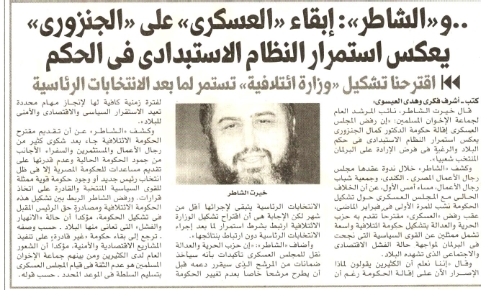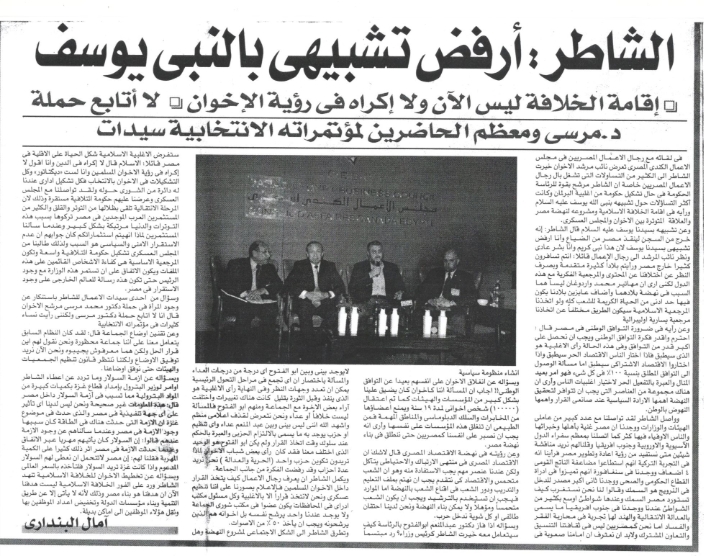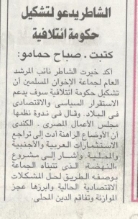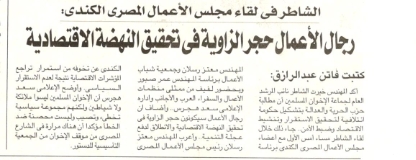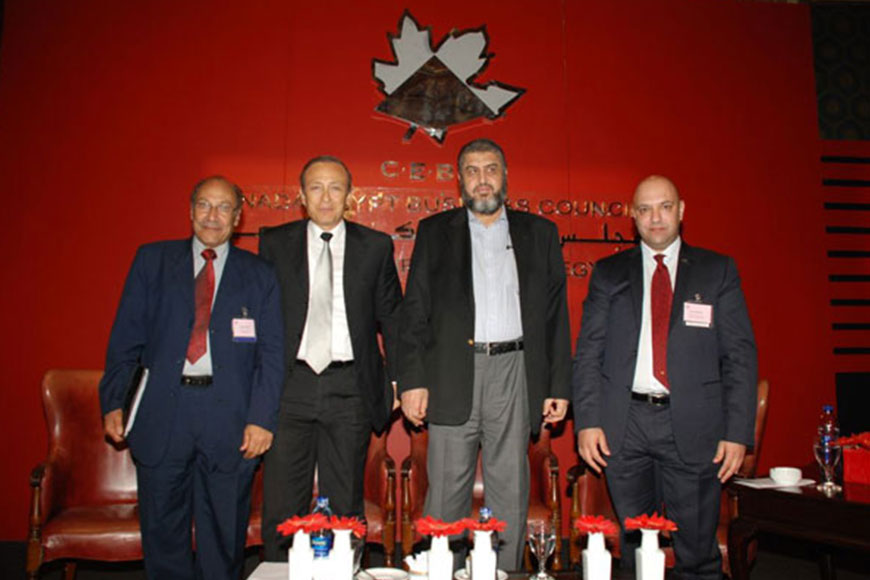
Date
Speaker(s)
Description
Panel Discussion with Eng. Khairat El Shater and prominent journalist and thinker Mr. Saad Hagras
The Canada Egypt Business Council (CEBC) hosted a special event and panel discussion featuring one of the key players in the Egyptian political and economic scenes, the Deputy Supreme Guide of the Muslim Brotherhood, the mother organization of the majority party in parliament, the Freedom and Justice Party (FJP), Eng. Khairat El Shater. Moderating the discussion was Saad Hagras, the prominent journalist and the Managing Editor of El Alam Al Youm newspaper. The event was focused on the Renaissance Project, which is led by Eng. Khairat El Shater and its propositions to develop Egypt’s economy and which is also at the core of the FJP’s electoral program.
The event is the tenth in a series of events addressing economic and political issues pertaining to Egypt after the revolution. Over 270 distinguished attendees were present at the event from ministers, ambassadors, CEBC members and guests.
CEBC Chairman, Mr. Motaz Raslan, delivered the opening remarks for the discussion. He spoke of the people’s legitimate goals, for which they took to the streets in the 25th of January Revolution: Bread, Freedom and Social Justice. He said that these are indeed the people’s basic rights, explaining that corruption is one of the main reasons behind the deteriorated economic conditions that Egypt is living at the moment and that the political confusion that is dominating the country is one of the factors to be blamed for the economic crisis Egypt is going through. He also spoke of the Turkish experience and quoted President Ardogan answering a question on how he was able to develop Turkey’s economy, saying that he did it through fighting corruption.
Hagras then took the floor and pinpointed that Egypt’s politics is dominated by a number of schools of thought; political Islam, to which El Shater belongs, the liberal school of thought, which is deeply entrenched in Egypt since the 1919 revolution and before, a leftist socialist school and a nationalist Nasserist school. He said that Egyptians are indeed living worse conditions after the revolution and that Mubarak’s regime is the sole reason behind that, but the political elite is to be blamed for these conditions as well. He sees that the Muslim Brotherhood deserves the lion’s portion of this blame, as the leading and largest political player on the scene, since they should have been a factor in reaching national consensus, but instead they attempted to exclude other schools of thought.
Khairat El Shater is the engineer of the Renaissance Project that is adopted by both the Muslim Brotherhood and the Freedom and Justice Party, the brotherhood’s political arm. El Shater has a celebrated career in the Muslim Brotherhood and is currently the Deputy Supreme Guide and has been a member of the Guidance Bureau of the Muslim Brotherhood since 1995. He has a master’s degree in Engineering, a bachelor degree in Sociology and diplomas in Management, Civil Society, Islamic Studies and more. He is also a businessman. El Shater started his word by giving examples on economic revivals in many countries mentioning some success stories from the east to the west around the world such as Malaysia, Japan, Brazil, Vietnam among many others, and lamented that Egypt is not in the same state as those countries, despite its massive resources and history.
El Shater sees that it is of critical importance that the Egyptian people live in an acceptable standard of living, “they may not all live in similar conditions, but should be given equal opportunities and treated justly”, he said. He said that this stance may not appeal to socialists, but regardless of differences in ideologies, it is all Egyptians’ dream for Egypt to be a powerful country, able to provide its people with an acceptable standard of living. He asserted his faith in the individual’s freedom to adhere to one school of thought or the other, as long as that person does not use violence or crime to further his goals. El Shater said that it is wishful thinking to expect parties to reach a perfect consensus and that this rarely takes place in countries however the country will democratically choose the school of thought it finds best, and that its choice will be respected.
He then moved to explain the necessary factors for an economic revival, saying that the most important factor is political will and another is vision. He said that it does not have to be a certain political group’s vision, but one that is widely accepted by the rest of the players in the political scene. El Shater further explained his group’s vision; the Renaissance Project, which was initiated as the FJP started to take the lead in the parliamentary elections and eventually won 47.2% of seats in both parliamentary houses, and thus was expected to take part in the coalition government, which was supposed to be formed. Upon that his group met with veterans in various related fields in order to build a vision for the country’s future, delegations from the party visited several countries to study their success stories and to find out what could be applicable in Egypt. Of the experiences that El Shater found particularly relevant, is the South African ‘transitional justice’ after the end of apartheid, restructuring of security agencies in Holland and the Spanish experience after Franco, among others. In this context, he spoke of the importance of partnerships with different countries in various fields, in order to benefit from these countries successes, which is something ongoing for the Muslim Brotherhood at the moment.
Upon implementation, El Shater said that the Renaissance Project would be presented for discussions in popular conferences and feedback from specialized professionals would be sought. He said that a prerequisite to proceeding with Egypt’s Renaissance Project is for the formation of a proper political regime with proper state institutions. He said that now the institutions remaining are the presidency, the cabinet, the constitution and a truly independent judiciary but that there are obstacles hindering the formation of these institutions, the main is that the ruling authorities have not demonstrated a genuine willingness to hand over power to the proper institutions. El Shater criticized their reluctance to allow for the formation of an active coalition government, thus the need for different political powers to reach a consensus on trying strenuously to get through the transitional period. He highlighted that Egypt’s legacy of dictatorship has crippled the current political players’ ability to form alliances, make compromises and untie for a common goal. “The Muslim Brotherhood is no exception; on the contrary, it has suffered discrimination and harassment from the former regime, which has caused to isolate itself from the other players in the arena”, he said. He sees that the Muslim Brotherhood, need some time to adapt to the new political atmosphere.
El Shater concluded his word asking all parties to unite their efforts for a project that puts Egypt back on the map and that provides its people with the proper living standards.
The floor was then opened to questions, which covered a range of subjects.
Egypt indeed needs a project the people can rally around, because the heightened sense of frustration among Egyptians is reaching its peak, especially that people are impatient to see the fruits of the revolution. Will the Muslim Brotherhood and its most prominent leader, after the Supreme Guide, be given a chance to implement its project of renaissance? this is something for the presidential elections that are taking place this month – the first democratic elections the country will witness – to decide.


